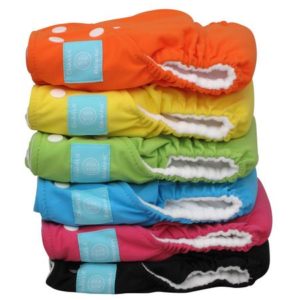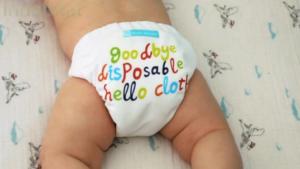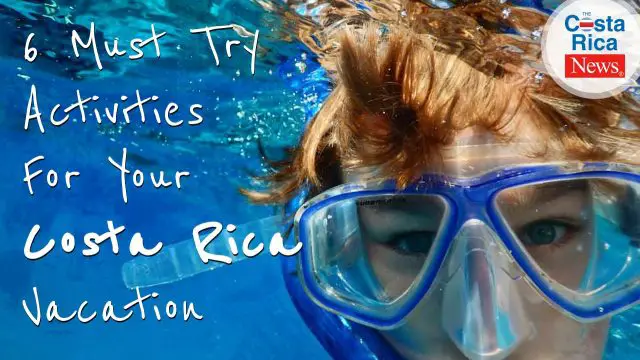We all love babies. They’re small, squeaky mini-versions of adults, full of energy and personality, and adorable to boot.
These tiny packages of joy come with a lot of needs, however, and we prepare for their arrival by accruing a whole lot of stuff. Most of this stuff ends up hardly being used, being thrown out or stored away to sit idly on this planet for countless years. It really is amazing how much space a baby can take up, but this isn’t quite necessary.
Here are some ways to easily and drastically diminish your infant’s carbon footprint:
1. Use Cloth Diapers Instead of Disposable Ones
I know this is a “gross” idea for a lot of new parents. Reuse diapers? Wash off poop in my clothes washer?
Yes.
It does sound unpleasant, but it really is a great way to save money, protect our Earth, and actually have some fun. Before My husband and I were cloth diapering, we were spending about $20 per week on cheap, off-brand disposable diapers. That adds up to $80 per month and just under $1000 per year! We started 100% cloth diapering with a start-up cost of $120. We bought thirteen pocket diapers (the kind that looks like a normal disposable, with snaps, that you stuff with inserts). With those original thirteen warriors, we kept our son in only cloth for over a year.
In just a year, we saved around $880! We could use that extra money, couldn’t you?
Also, we managed to keep around 70 diapers a week, or 3,640 diapers a year from going to the landfill! We personally made this change because we desired a healthier planet for our children to grow up in. We also wanted our children to know that they lived a greener life from the start. Yes, it may have been a little more work for us parents, but once we get used to it, we wouldn’t have it any other way.
In addition to saving money and the world–one cloth diaper wash cycle at a time–our babies look extra cute in them! With an endless supply of systems, fabrics and prints to choose from, your baby can rock a fluffy butt with style. Moms are proud of their cloth diaper “stashes” as well.
The running joke is “How do you know if a mom cloth diapers?….Don’t worry, she’ll tell you!”

2. Buy Second-Hand and Accept Hand-Me-Downs
In America today, if it isn’t new, it’s trash.
Every new mom spends her maternity months and a good chunk of the family income creating a paradise for her awaiting bundle to enjoy. Stores like Babies “R” Us make their fortune on the average new mom, and their friends and family who are expected to lavish their bump with the future “necessities.”
This just isn’t the real case, however. Babies don’t need much! I know it’s hard to believe that they need that new bedroom furniture, wardrobe, bouncy chairs, play pens, bottles, swings, mats, and room full of toys. I’ve been there; I’ve had a home with barely a place to sit amongst these items… and I didn’t use much of it! Our son never slept in his bassinet, crib, or play pen–not once. I ended up being showered with gently-used clothes from my mommy-friends, and never needed to buy clothes for him. He is still receiving a box of hand-me-downs from friends every size change.
If you want to be smart about preparing for a new baby, wait on the big stuff. Should you find you really could use a play pen or jogging stroller, seek out a good-quality, used one online for less than half the retail value. Instead of creating a baby registry at your local infant wonderland store, ask for a thoughtful card with money for the wee one’s first savings account.
3. Use Natural Products on Your Baby
Parents today are becoming more picky about what materials they put on their infant’s sensitive skin. We are raising our eyebrows at the grocery store, while we pour over every ingredient list on the infant shampoo shelf. Well done, us! It’s about time.
[quote_box_right]Ditch the chemical sprays! Click here to learn about 6 (Mostly) Natural Ways to Prevent Mosquito Bites.
As I’ve gone from using J&J without a second thought to doubting even the bottles with the flashy word “organic” advertised on them, a light bulb has gone off. Why do I need any of these things? Why not wash my baby in pure water? Does she really need soap? When my child has a diaper rash, doctors have even recommended just using water and letting them air dry! Doctors! No prescription necessary.
I’ve fallen into a nice system of showering with my baby (no big plastic bathtub required) and rubbing her down in extra-virgin coconut oil or olive oil, and her skin is flawless! Simple simple. I don’t know how much money I’m saving doing this, but I’m sure it’s a lot. I do know that I’m helping this world, one baby at a time, by not buying unnecessary, chemical-filled products every month.
4. Breast Feeding
Two of the biggest industries on the baby market are formula and baby food. It’s insane. They’ve done such a great marketing job, that many girls grow up thinking that babies are supposed to be fed with a bottle! If we really think about it, this is not what Mother Nature intends. Now, many mothers do wish to breast feed, but have issues that they cannot surmount, but this is not the average occurrence. According to the Centers for Disease Control and Prevention, only 25.5% of babies are exclusively breastfed through their first six months–talk about going against nature from the start!
This number could do with a serious increase, in my opinion (and in the opinion of most babies!). If the average mom breastfed their baby at least for the first year, that would make a dramatic impact on the Baby Industry and her punching-bag, the environment. In regards to the prepackaged and shelved baby-food aisles, why do we need these either? I’m sure each of us is capable of smashing some fresh banana or avocado into a bowl with a spoon. There is even the new method called Baby Lead Weaning, which suggests that by the age of six months, babies can pick up their own food and feed themselves, along with you at meal time.
This requires that the parents separate some of their fruits, meats, vegetables, and so on, before seasoning, and simply offer a few baby bite-sized pieces to their infant to try out. Solids are only for tasting before the age of twelve months, anyways, and breast milk (or formula) should be the primary source of nutrition until then.
5. Let Children Use More of that Incredible Imagination
This generation of children is raised so much differently than we and our parents and grandparents were. Children are less likely to be seen playing ball in the streets, in the parks, and in tree-houses.
Where are they?
The are in their rooms, on the Internet, watching TV, or playing video games. They are getting less exercise, less fresh air, and less sun. Their imaginations are taking a big hit as well. If I leave my two year old alone in our living room, without a computer game, iPad, or an army of plastic toys, he will be just fine. He’ll be a monkey in the zoo, bouncing from couch to couch; he will be a cowboy, flinging a string around in circles; he will be a teacher, instructing his fingers and toes how to count to ten. When all else fails, I’ve heard it said time and time again, the best toy is a cardboard box.
[quote_center]Babies and young kids don’t need a million toys made in China or India to have fun.[/quote_center]
I think one of the best things we can do to minimize our children’s carbon footprints is to bring them back outside, and let them explore leaves, sticks, and those interesting ants on the sidewalk. I grew up in a world of tag in the front yard, hikes through a forest I called “Fern Gully,” and dips in the swimming holes along the river. I’d rather have this for my son and daughter than a life of indoor, lazy activity.
Make a stand, and put a stop to their hours upon hours inside, ruining their eyesight on digital doo-hickies.

By making these few adjustments while raising the leaders of tomorrow, we can enjoy a more natural approach to parenting. Just one of these changes can make a big impact on the world around us, our own Mother Earth. It could be a better life for us and for our children, and it will encourage the families of the future to appreciate this vast and beautiful planet, that needs our respect and love.
Our columnist is a mother, blogger, and world traveler. Now Emily R-P Shea is the first columnist of our new section “The Great Escape” featuring articles written by a small handful of US expats who have some amazing stories to tell. From why they chose to live in Costa Rica to how to raise a more eco-friendly baby, The Great Escape will be a great reference as well as fascinating entertainment for all travelers who find themselves in paradise.


Comments are closed.